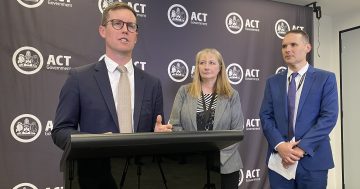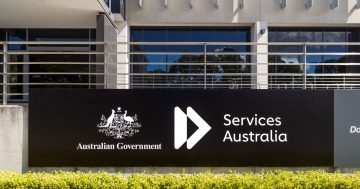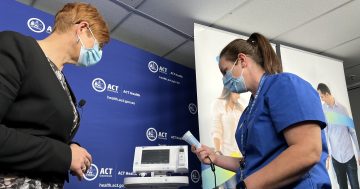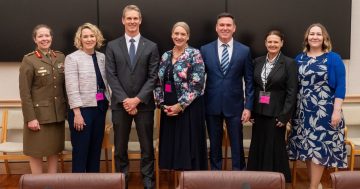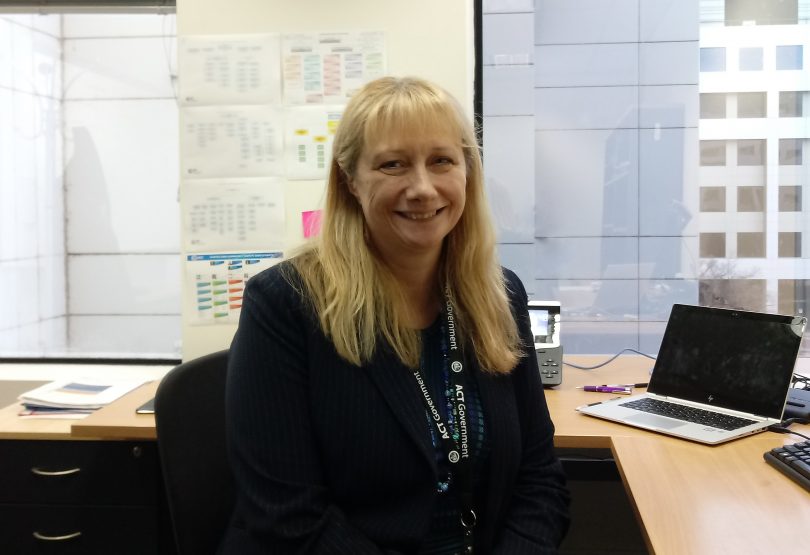
ACT Chief Digital Officer Bettina Konti is excited by the opportunities to effect change for the better. Photo: Ian Bushnell.
The job description included being fearless but the ACT’s new Digital Transformation Chief isn’t about to take risks when it comes to our personal information or how a service is delivered.
Chief Digital Officer Bettina Konti told the RiotACT that as recent cybersecurity breaches in governments and industry had shown, there was no such thing as a 100 per cent foolproof system but keeping information secure was paramount.
“I’m never going to be fearless about putting data out there that shouldn’t be out there,” she said in an exclusive interview.
Ms Konti, who was recruited to the ACT Government from the Federal Department of Health, said cybersecurity required a multi-faceted strategy, including investigating new technology such as blockchain.
“We need to focus very carefully on the end to end journey of a piece of data, making sure that we know when we’ve got personal information involved in the interaction, and that might be coupled with other sensitive things,” she said.
“It’s about making sure: firstly that your people are educated about information security; secondly that your systems are appropriately accredited, the right security controls are in place; and thirdly that we are always proactive about technology on the horizon that can do a better job.”
All governments need to work together to continually stay on top of cybersecurity to protect people’s information and ensure that it was as safe as it could be from being hacked or stolen.
Ms Konti said any new digitised services required active engagement with the community and rigorous road-testing before going live to ensure they achieve the intended outcome.
She said being fearless was more about challenging the way the government did things and motivating its workforce to jump on board the transformation train.
“Part of the job is how we grow new business capability in our workforce. New members to our workforce, to quote the evangelists, will already be digital natives. It’s more likely [the challenge will be] the people who have worked in the ACT Public Service for a long time and are used to a certain way of doing things, and who are very comfortable with that way. What is it that you can put before those people to excite them about a different future?” she said.
“I have an interest in making sure that the decisions we make about the next services, or the next pieces of data that we want to do analytics on, are actually done with full transparency and openness and collaboration right across the services because that’s how you get buy-in.”
The whole-of-government nature of the role and the ACT Government’s commitment to transforming government practices and services was a big incentive for the Canberra born and bred career public servant to make the move from running the National Cancer Screening Program.
The scale and size of the ACT also offered the potential to achieve a great deal.
“The executive are absolutely committed to the ACT government improving services to the community and partnering with business to boost the ACT economy, diversifying our economy from just government industry at its centre,” she said.
“So far it’s been really great to see, and I can see there is so much opportunity because everybody seems to be really committed to making the change.”
Ms Konti has two immediate things on her plate – the next phase of service transformation and prioritising what data should be deployed to improve efficiencies and enhance services.
On the service horizon, Ms Konti is looking to extend services such as car registration and other transactions to phones and instantaneous change of details at the point of transaction.
“The next obvious step would be to move that to mobile where you get a push notification saying would you like to pay your rego now, and set that for payment,” she said.
But the real opportunities involved the kinds of things that haven’t already had the bulk of the burden taken out of them ”like being able to get a request on your phone asking whether you approve of little Jimmy going to the concert this afternoon or this excursion or whatever, yes or no, would you like to pay for that now, yes or no, off it goes and it’s done”.
“Even further into some of those interactions where currently I have to tell government that something has changed about me. In the future would I really need to tell government what has changed?” Ms Konti said.
She flagged the possibility of change of address details when moving house being captured with approval at the point of purchase and notified instantaneously to government or businesses that one might interact with.
“Rather than having to go online and tell people one by one that I’ve changed my address. There’s an awful lot of burden in that,” she said.
The goal was to make services easier to use with seamless interactions but also to create efficiencies back inside government. “We’d like to make the whole thing end to end digital so that our staff have got the opportunity to move towards more higher value activities over time,” she said.
Ms Konti is also assessing with the directorates what to draw from the so-called data lake this financial year.
“What are the data priorities that we want to bite off for the next little while to add value to their business processes by automating reporting that is currently very manual and process intensive, but also what are the new insights that will enable different services or better services to be provided to the community, for example, healthy waterways, family and community services, Housing ACT,” she said.
Expect more community engagement from the Government seeking to learn which interactions are the hardest for people to do and which transactions are hurting the Government most.
With Government also committed to broadening the range of people it engages with, Ms Konti will also be looking to find ways to reach different kinds of people and make it easier for them to contribute.
Three proposed investigations by the Auditor-General this financial year into ICT strategic planning, Access Canberra and Shared Services will also ensure a busy time for Ms Konti.
While her office is always looking to other jurisdictions and countries for inspiration or lessons, the ACT with its growing ICT industry does have the potential for coming to some original solutions that might prove to be models elsewhere.
“Where that is possible, I am really hopeful we’ll be able to find them,” she said.












